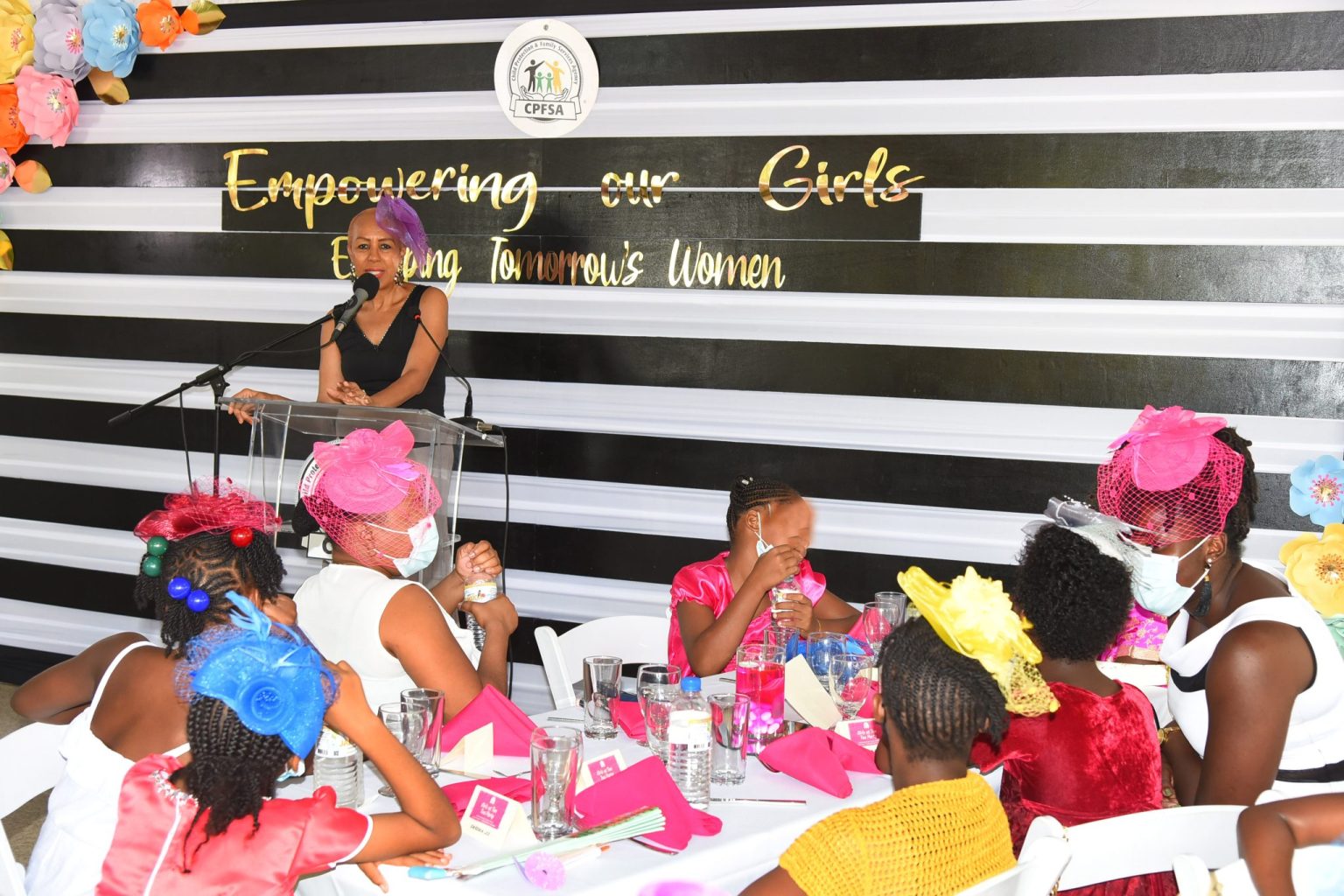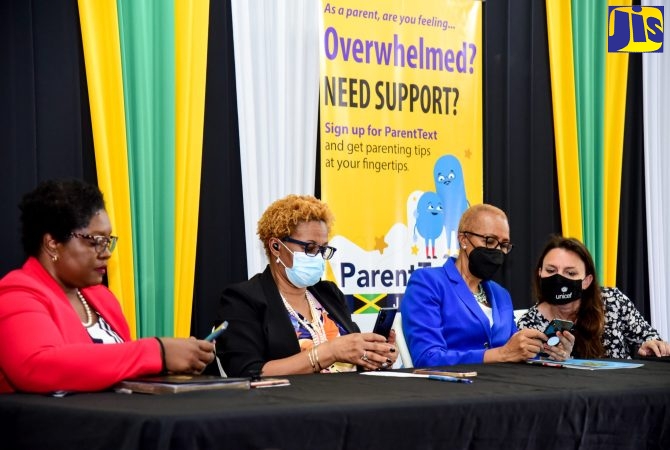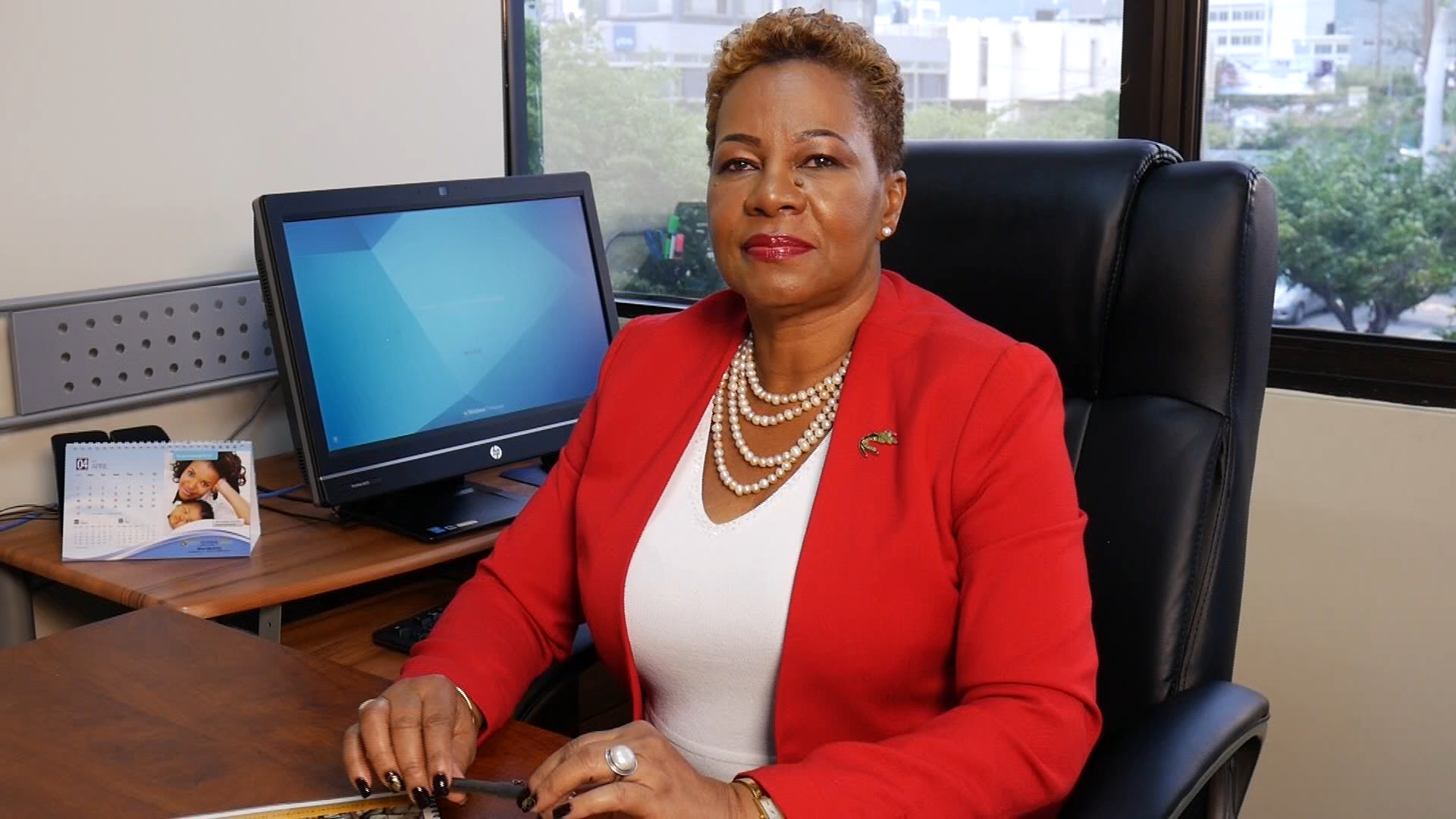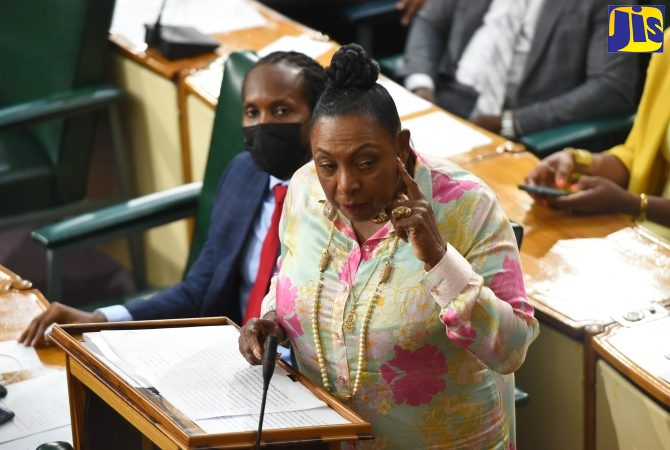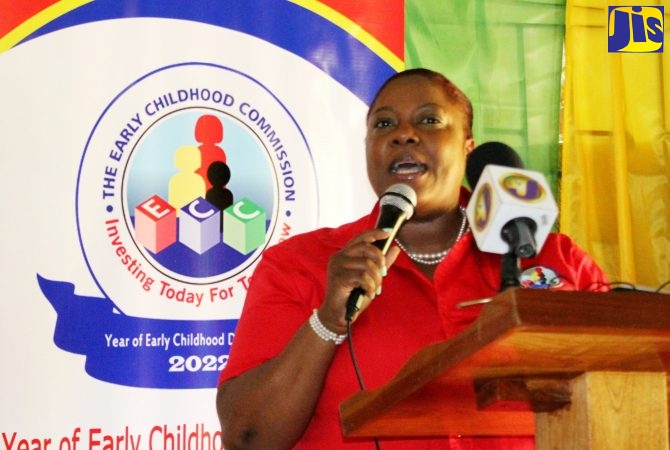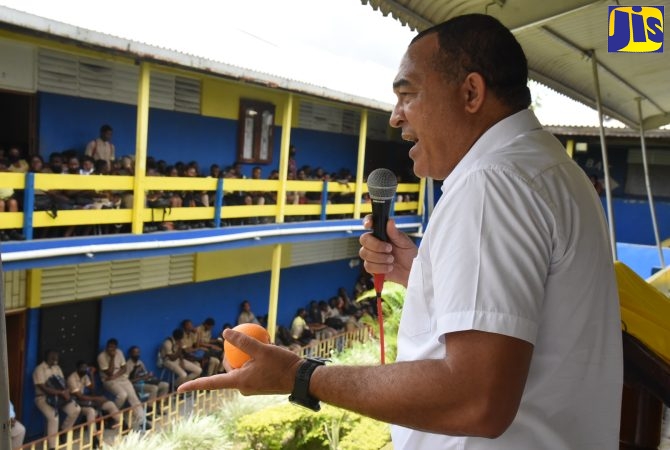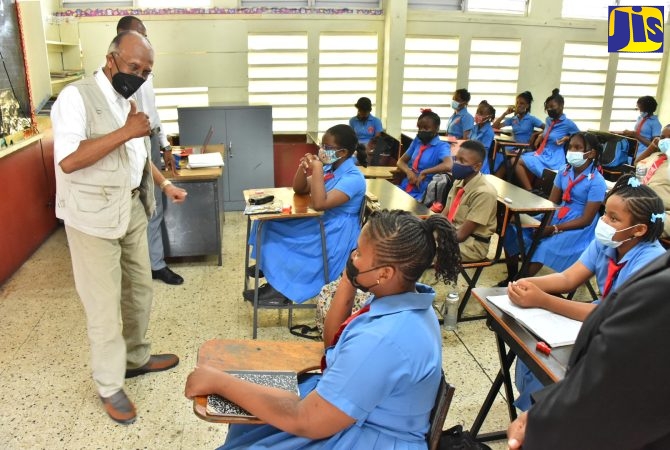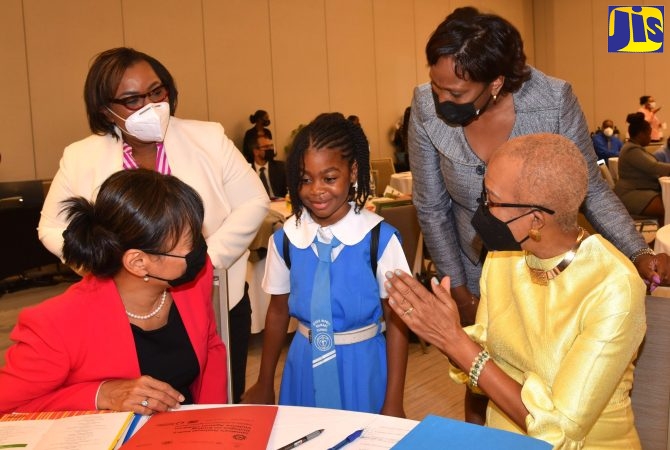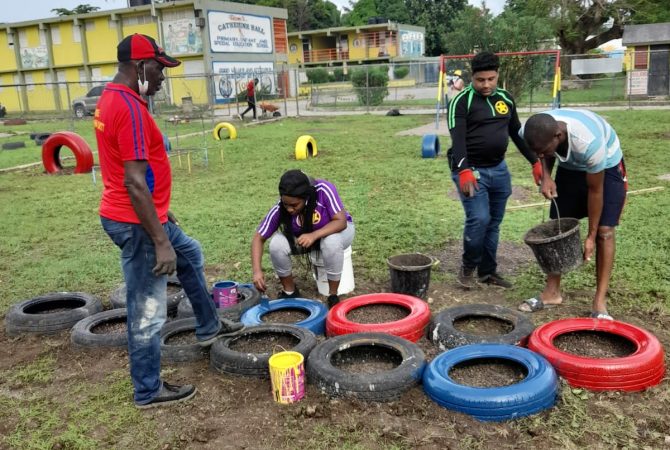The Honourable Fayval Williams Minister of Education and Youth enpowers young wards of the State during the Child Protection and Family Services’ Girls at 10 Empowerment Tea Party held recently.
Category: Uncategorized
‘Fathers Read Too’ Campaign Launched
As part of a campaign to encourage more fathers to read to their children, the Ministry of Education and Youth has unveiled a mural at 20-23 Church Street in downtown Kingston.
The unveiling of the colourful artwork depicting a father reading a book with his child, coincides with the observance of Father’s Day (June 19).
Dubbed ‘Fathers Read Too’, the campaign is aimed at highlighting the role of fathers in the educational development of children.
The mural which was commissioned by the ministry, was done in partnership with United Nations Children’s Fund (UNICEF) and the Kingston and St. Andrew Municipal Corporation.
It was unveiled by Minister of Education and Youth, Hon. Fayval Williams; Chief Education Officer (Acting), Ministry of Education and Youth, Dr. Kasan Troupe; Permanent Secretary (Acting) in the Ministry of Education and Youth, Maureen Dwyer; Country Representative, United Nations Children’s Fund (UNICEF) Jamaica, Mariko Kagoshima; Mayor of Kingston, Senator Councillor, Delroy Williams; Project Manager, Fathers Read Too, Shantole Thompson and Director-General, Jamaica Library Society, Maureen Thompson.
In her remarks, Minister Williams called on the nation’s fathers, especially those with young children, to begin a habit of reading to and with their children, “if you don’t already do so.
“By starting the journey of building a lifelong love of reading for pleasure, parents are giving their children the opportunity to be the best they can be. Children who read for pleasure do better in a wide range of subjects at school and it also positively impacts children’s wellbeing,” the Minister said.
She added that reading together brings comfort and reassurance, confidence and security, relaxation, and happiness to children. “Giving a children time and the full attention when reading them a story, tells them they matter, it builds self esteem and their vocabulary. They learn more words, they learn new words. Reading feeds their imagination. Reading to your children is one of the greatest gifts fathers can give,” she said.
Minister Williams said the ministry has many resources available on its website and encouraged parents to visit libraries with their children.
She further noted that the Jamaica Library Service has an island wide network of 111 public and 898 school libraries.
“Ask your child to check out a book from school and bring it home. The JLS also has a mobile library service which serves some 394 communities, so there is no absence of resources. Even on your devices that you have, smartphones, laptops, tablets, lots of e-books are available there as well,” she said.
Minister Williams added that throughout the month of June and beyond, the ministry will continue the campaign. “We know that reading is the best gift from a father to a child because it will last for a lifetime,” she said.
Ms. Kagoshima said the campaign raises awareness and empowers fathers, noting that involved fatherhood is good for children. “You are giving spotlight to many fathers who do make this difference and letting other fathers know that you too can have a positive impact on your child’s development through reading,” she said.
Mayor Williams said the entire wall space on Church Street will be covered with murals over time. He said the placement of the mural highlights the totality of the family. “It’s right next door to another mural that is speaking to mother and child and so we see the totality of growing our children,” he said.
Project Manager, Fathers Read Too, Shantole Thompson said the mural has components such as the Agapanthus Lily which represents tenderness and compassion and is considered a magical and medicinal plant that only blooms in June, the month when Father’s Day is observed.
The mural was painted by Anthony Smith.
New Messaging Service Launched To Help Parents
A new mobile messaging service dubbed ‘ParentText’ has been launched, providing another layer of support to Jamaican parents in becoming more effective in raising children.
The service, being executed under the United Nations Spotlight Initiative and funded by the European Union (EU), provides tips to parents and caregivers of children up to age 17 via text messages, audio and video clips.
The information is delivered through the popular mobile application, WhatsApp.
Speaking at the official launch at the Ministry of Education and Youth’s Caenwood Auditorium in Kingston on Friday (June 17), portfolio Minister, Hon. Fayval Williams, said the service “is a welcome addition to the suite of resources available” to Jamaican parents.
“Research and studies confirm that many parents have to be guided and coached to be able to do a better job,” she pointed out.
She said that through the platform, it is hoped that more parents will “take their responsibilities seriously and become more directly involved in their children’s education and overall care”.
UNICEF Jamaica Representative, Mariko Kagoshima, said the launch of the service locally is in light of research, which indicates that 85 per cent of Jamaican children under 15 years old are being subjected to violent discipline at home.
“Parents need help to learn skills to better understand and deal with the challenges of parenting. These skills can help break the cycle of family violence or prevent it from happening,” she said.
The developers of ParentText Jamaica, which is currently in the pilot phase, are aiming for 1,000 sign-ups across four of the Spotlight Initiative parishes – Kingston and St Andrew, St. Thomas, Clarendon, and Westmoreland.
Persons can access the service by texting the word ‘PARENT’ to 876-838-4897 on WhatsApp.
This initiates an automated response with a series of basic questions that will lead to evidence-base advice and information in areas such as positive reinforcement, relationship building and child behaviour management.
The messages were created and recorded with familiar local voices such as Owen “Blakka” Ellis and Glynis Salmon of Parenting Partners Caribbean (PPC).
The programme is supported by the Women’s Centre of Jamaica Foundation, Children First Agency, PPC and the National Parenting Support Commission (NPSC).
It was originally globally developed by the University of Oxford, Parenting for Lifelong Health (PLH) and IDEMS International (Innovations in Development, Education and the Mathematical Sciences) with funding from the LEGO Foundation.
Jamaica is the first in the Caribbean to launch ParentText. The service is also being implemented in Malaysia.
Education Ministry Seeks Persons For Electronic Marking Of PEP
The Ministry of Education and Youth, through the Student Assessment Unit, is inviting suitably qualified individuals to apply for the position of Marker for the first official electronic marking of the Primary Exit Profile (PEP) Grade Five assessment.
Applicants must be trained teachers with at least three years’ work experience; currently teaching, preferably at the primary-school level (grades four, five and six); and have a working knowledge of the National Standards Curriculum (NSC).
Those who have participated in any of the Student Assessment Unit’s Training Workshops will hold a distinct advantage.
Successful applicants will be required to have reliable Internet connection; have a functioning laptop or desktop computer; use Google Chrome Browser throughout the activity; participate in the marking process as part of the team to mark open-ended response-type questions in one of the following: Language Arts, Mathematics, Social Studies or Science; and use the scoring rubric to accurately score students’ responses.
Interested persons may apply at:
https://docs.google.com/forms/d/e/1FAIpQLSfIMyH2vf-5WKrbRTLL3Tk3-
_8XtzeJNYba_eawciNf0ikHag/viewform
The deadline for submission of applications is Monday, June 20. For further information or queries, persons can contact the Student Assessment Unit by telephone at (876)948-2752 or by email at [email protected].
20 Schools and Communities Equipped with Playing Surfaces
The Sports Development Foundation (SDF) spent more than $117 million in the last financial year to instal 20 playing surfaces in schools and communities.
Minister of Culture, Gender, Entertainment and Sport, Hon. Olivia Grange, in making the disclosure said that the initiative will be ramped up this financial year.
“Reigniting lives and livelihoods also includes infrastructure and programmes to nurture talent and enable people to pursue their passions,” she said.
Minister Grange was making her contribution to the 2022/23 Sectoral Debate in the House of Representatives on June 8.
Meanwhile, she said the Institute of Sports (INSPORTS) engaged more than 1,000 young people through its grassroots summer camps in Kingston & St Andrew, St. Catherine, St. Thomas, Manchester, Trelawny, and St. James.
INSPORTS also conducted a talent search and recruited 35 boys for its Cricket Incubator programme, through which they are learning the game and reigniting a passion for cricket.
The entity reintroduced the National Primary Schools Championships last month, which includes three regional championships and, for the first time, a national championship dubbed ‘Boys and Girls’ Junior Champs’.
ECC Encourages Parents To Utilise Services Of Parent Places
The Early Childhood Commission (ECC) is urging parents to utilise services provided at its 74 Parenting Places, to ensure that they can manage demanding situations in child-rearing.
Making the call at a recent mental health forum for parents and students, held at Paul Mountain Primary School in St. Catherine, Community Relations Manager at the Commission, Tanisha Miller, said once parents become anxious and stressed, they should go to a Parent Place, where they will be helped, along with their children.
“When you are not sure how to deal with your little ones (children) at home, when they are giving a lot of talking, and you think that they are just rude and disobedient, get the help,” she said.
Miss Miller said that no parent will be turned away from a Parent Place, and the children will be stimulated “while you are being counselled”.
The parish of St. Catherine has 13 Parent Places.
Miss Miller told the forum that the ECC also operates 132 Brain Builder Centres, which have nurses and day-care centres, and the services are free to parents.
“Meals are provided, trained teachers are there, and caregivers are there for you,” she told the audience.
The Commission is an agency of the Ministry of Education and Youth and has comprehensive programmes designed to meet the language, physical, cognitive, creative, socio-emotional, spiritual, cultural, and school-readiness needs of children.
It was established by the Early Childhood Commission Act (2003), in keeping with the strategic goal of the Government of Jamaica to improve the quality of early childhood care, education and development within the early childhood sector.
Students Encouraged to Manage the Foods they Eat
Students, particularly at the secondary level, are being encouraged to practise good nutritional habits by managing the foods they eat.
This can be done by boosting fruit, vegetable and water intake and reducing their consumption of foods and beverages having relatively high concentrations of salt and sugar.
Minister of Health and Wellness, Dr. the Hon. Christopher Tufton, is also urging parents, guardians, and teachers to play their part in guiding the youngsters along this path.
He emphasised that this is imperative to ensure that students are provided with the nutrients essential to their growth and development, while avoiding the foods that can potentially compromise these.
“One of the things we have to learn in our school system… is that the food that you eat, after a while, they become habits; and you can become addicted to certain foods. Sugar, for example… [if you consume a lot of it], after a while, you [can become] addicted to it and you will want it every day… [and it’s the] same thing with salt,” Dr. Tufton said, adding that “what you eat defines your body”.
He was speaking during activities organised by the Ministry of Health and Wellness at Tacius Golding High School in St. Catherine, on Thursday (June 2), to mark Caribbean Nutrition Day.
Dr. Tufton said consequent on the significant consumption of sugar and salt by youngsters, “too many of you are getting sick too early in life”.
“As students, [in] trying to be the best that you can be, you have to manage the things that you put into your body, because what you eat defines your body,” he added.
The Minister said the students are at the stage where they can make those decisions “on your own, when you come to school”.
He also encouraged the youngsters to engage their parents and guardians in discussion on what foods they consume at home.
Against this background, Dr. Tufton reiterated that the Government, through the Ministries of Health, and Education and Youth, will be implementing a Nutrition Policy that guides the quality of foods served to students at schools.
“Over the next month, you’re going to hear that cafeterias can only serve certain types of foods; they are going to have to cut back on the salt [and] the sugar. So, we’re going to promote good nutrition, which means a fruit a day, more water, and less salt and sugar, because when you eat well, it helps your brain to function [and] you learn more,” he indicated.
Dr. Tufton advised that he and other representatives of the Ministry will also be engaging parents, guardians and school administrators to discuss the matter.
“We have a long road to travel, but I believe that you have it in you to do well. So, let’s work together to get the job done,” he added.
Caribbean Nutrition Day, which was initiated by the Caribbean Food and Nutrition Institute (CFNI) in 2005, is observed annually on June 1.
Thursday’s commemorative activities at Tacius Golding and other schools and locations islandwide, represented an extension of engagements that started the previous day.
They were held under the theme – ‘Healthy Eating, Active Living – Shake the Habit’, in keeping with the focus on salt reduction in the diet.
These included several displays and presentations by representatives of the Health Ministry and several stakeholder partners, such as the National Parenting Support Commission (NPSC), National Health Fund (NHF), Early Childhood Commission (ECC), Heart Foundation, and Diabetes Association of Jamaica.
JETC Chairman Visits Schools
As the Government seeks to transform the education sector, the Jamaica Education Transformation Commission (JETC) is engaging with academic institutions islandwide for feedback on current policies and recommendations.
This follows the release of the JETC report on January 13, 2022, which outlined recommendations to the Government for the advancement of the sector.
Leading the discussions is Chairman of the Commission, Professor Orlando Patterson, who is on a two-week working visit to the island. He is expected to leave on Wednesday, June 8.
Professor Patterson started his school visits with May Pen Primary and Glenmuir High Schools in Clarendon, as well as Church Teachers’ College in Manchester on May 30.
He pointed out that he would visit schools he considered to be either “good, bad or average”.
“I wanted to meet with the teachers. I wanted to talk to them about what they thought of the report, and I was happy to see that they seem to have read it and agreed with some of the fundamentals, like the importance of early-childhood training,” the Professor said.
He noted that while he thinks the Government to be in strong support of the report’s recommendations, he will continue to encourage more resources to be allocated to the pre-primary and primary academic levels.
“Get the foundation right. The early-childhood sector is what we need to emphasise,” he said.
On that note, Professor Patterson reiterated from the report that the implementation of initiatives such as the Primary Exit Profile (PEP) is a step in the right direction.
“That was a good move because it shifted the focus from memory learning to one that emphasises the extent to which students’ critical faculties are being exercised, and students learn to think rather than just to regurgitate [from memory],” he pointed out.
Meanwhile, Principal of Glenmuir High, Marsha Smalling, while speaking with the Professor, recommended that “more time” be given for the implementation of creative initiatives and programmes attributed to the sector.
“They’re brilliant ideas, but we’re not giving them time to work, and it is not easy to always be readjusting [your] mindset to facilitate new initiatives,” she said.
In order to support the report’s recommendations, Prime Minister, the Most Hon. Andrew Holness, during his 2022/23 Budget Debate presentation on March 17, 2022, announced that he would appoint an Education Transformation Oversight Committee (ETOC) for the implementation of the report.
It will be responsible for monitoring and publicly reporting on the progress of implementation, while being chaired by Financial Economist and a Director of the Development Bank of Jamaica (DBJ), Dr. Adrian Stokes.
Professor Orlando Patterson is the John Cowles Professor of Sociology at Harvard University in the United States.
As a historical and cultural sociologist, he previously held faculty appointments at the University of the West Indies, his alma mater, and the London School of Economics and Political Science in England.
Minister Condemns Violence Against Children
With an average of 34 calls on matters of child abuse received each day by the Child Protection and Family Services Agency, Minister of Education and Youth, Hon. Fayval Williams is reigniting the call to end violence against Jamaican children.
The Minister noted that corporal punishment, which is defined as physical punishment such as caning or flogging, is still being practiced in the country despite the government being strongly against the act.
“Data from the Jamaica Survey of Living Conditions shows that corporal punishment is the most used method across urban and rural areas, across age groups, across [genders], across [social classes],” the Minister informed.
The data shows, however, that children in the corporate area are more likely to be exposed to corporal or psychological aggressive methods of punishment than children in rural areas. Meanwhile, the top three corporal punishment methods are slapping, beating with an implement and pinching. Almost 70% of boys and 65% of girls are likely to be slapped.
“Some parents or guardians even go further with psychologically aggressive methods, meaning they quarrel, they shout, they deny food,” the Minister said.
She was speaking at the opening ceremony for the National Policy Dialogue on Ending Violence Against Children at the AC Marriot Hotel in Kingston on Wednesday (May 25).
The event took place just one day after the world was shaken by a mass shooting of more than 18 children at a Texas school in the United States. The Minister described the situation as ‘tragic’.
“Sadly, we’re all too aware of acts of violence against children locally,” she said, noting that since the implementation of 211 helpline, the increase in calls shows that the situation is worse than previously thought.
She said child abuse is a “national imperative” as in some cases, the abused child grows into an abusive adult which is detrimental to “the health of Jamaican society as a whole.”
“We want to get the message all across Jamaica, that violence against our children is not acceptable, and we should not normalise it,” the Minister said.
The National Policy Dialogue is Jamaica’s premier in-country contribution to the ‘Together to End Violence Solutions Summit Series’, which was launched in December 2020 by the Global Partnership to End Violence Against Children. Jamaica became a signatory to the global partnership in 2016.
FLA Renovates Four Basic Schools
Four early-childhood education institutions across the island have been given a much-needed facelift by the Firearm Licensing Authority (FLA).
The agency undertook critical repairs and beautification works at the schools, which are situated in communities where the FLA offices are situated, on Labour Day, May 23.
The beneficiary institutions are Catherine Hall Primary and Infant in St. James; Mountain View Primary and Infant in St. Andrew; Discovery Bay All-Age (Infant Department) in St. Ann; and Mandeville Infant, Manchester.
At Catherine Hall Primary and Infant, where improvements were made to the play area, Vice-principal Kaye-Esther Malcolm, told JIS News that the work done was critical in ensuring that the institution meet the standard for certification.
The FLA repaired and painted the school’s swing set and monkey bars, restored and painted the obstacle course tyres, and placed gravel and sand at the play area. The team also painted the classroom partition wall.
“I am so excited because the FLA team did such a great job. This is so important because we are getting ready to be certified and the play area will play a big part in that because we have most of the things in place already,” she said.
“So, FLA, we are so grateful, and we are so happy that you are trying to make a difference and to bring this to a successful space.” Ms. Malcolm said.
At the Mountain View Primary and Infant School in St. Andrew , the FLA team did major works to restore the guardhouse, tile the school’s stage and paint a perimeter wall.
Principal at the institution, Michelle Robinson, expressed gratitude to the agency for partnering with teachers and parents to make the activities a success.
“We are extremely grateful to the FLA for taking on three huge projects for the school. All three projects are costly, and it was really difficult for us to get these done.” Ms. Robinson noted.
She told JIS News that the FLA was willing to partner with the school without hesitation.
“The FLA chose to partner with us, saving us a lot of money and helping us to build our brand, this brand of excellence. So, we’re extremely grateful to [the FLA] team, which came out in full numbers and did an excellent job. We have been blessed by the FLA and we’re extremely thankful for their support.” Ms. Robinson noted.
At Discovery Bay All-Age and the Mandeville Infant, the FLA teams marked and painted the pedestrian crossings.


